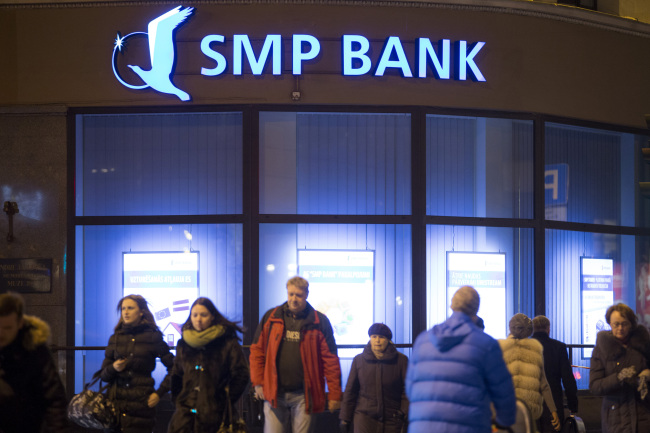MOSCOW (AFP) ― Several Russian banks on Friday saw their customers barred from using Visa and MasterCard credit cards as U.S. economic sanctions over Russia’s takeover of Crimea began to dig in.
U.S.-based Visa and MasterCard have stopped servicing the credit cards of customers at Russian banks due to the economic sanctions announced in Washington, the banks said Friday.
A Visa spokesman told ITAR-TASS news agency that the move was to “in order to comply with U.S. law” and concerned four banks: Bank Rossiya, Sobinbank, SMP Bank and InvestKapitalBank.
U.S. President Barack Obama on Thursday said a list of Russians targeted by sanctions had been extended to include billionaire businessmen bankers believed to be close to Putin.
One bank, Bank Rossiya, was also added, described as a “crony bank” for the elite.
Americans and American businesses, such as Visa and MasterCard, are forbidden from any dealings with anyone targeted by the sanctions and any assets they might have in the United States are frozen.
U.S.-based Visa and MasterCard have stopped servicing the credit cards of customers at Russian banks due to the economic sanctions announced in Washington, the banks said Friday.
A Visa spokesman told ITAR-TASS news agency that the move was to “in order to comply with U.S. law” and concerned four banks: Bank Rossiya, Sobinbank, SMP Bank and InvestKapitalBank.
U.S. President Barack Obama on Thursday said a list of Russians targeted by sanctions had been extended to include billionaire businessmen bankers believed to be close to Putin.
One bank, Bank Rossiya, was also added, described as a “crony bank” for the elite.
Americans and American businesses, such as Visa and MasterCard, are forbidden from any dealings with anyone targeted by the sanctions and any assets they might have in the United States are frozen.

Clients of the banks on Friday found themselves unable to use their credit cards to make purchases or to withdraw money from cash machines not belonging to the banks.
Bank Rossiya said in a statement that Visa and MasterCard had “without warning stopped providing its payment services to the bank’s clients.”
Bank Rossiya’s affiliate banks, Sobinbank and InvestKapitalBank, were also affected.
Putin responded Friday by defiantly vowing to open an account at Bank Rossiya and have his salary transferred there.
SMP Bank, which is controlled by U.S.-blacklisted brothers Arkady and Boris Rotenberg, said in a statement that it believed the blocking of its customers’ credit cards was “unlawful” because the sanctions targeted not the bank but its shareholders.
None of the banks affected have a major high-street presence, but Bank Rossiya is used by companies within Gazprom energy giant to pay salaries to staff, the Interfax news agency reported.
“The main focus of Bank Rossiya is corporate clients ... so this will not prompt public panic,” said banking analyst Mikhail Kuzmin of Investcafe.ru.
“I don’t think Bank Rossiya has many funds in the U.S., it’s mainly businesses within Russia, they are not under any threat.”
Kuzmin estimated to AFP that “tens of thousands” of people were affected at all the banks.
Bank Rossiya came 15th in a ranking of Russian banks by Interfax news agency last year in terms of the size of its assets.
Russia’s Central Bank said in a statement on Bank Rossiya on Friday that “the operations that come under sanctions are not having a significant impact on the financial stability of the credit organization.”
“If necessary, suitable measures will be taken to support the credit organization and give reliable protection of the interests of its account holders and creditors,” the Central Bank added.
So far the economic sanctions “will not affect Russian business as a whole,” said Yevgeny Nadorshin, chief economist at AFK Sistema.
“These sanctions send a signal that the U.S. did not stop at its first round (of sanctions). But it’s a long way from a serious influence on the economy,” he told AFP.
“If the sanctions limit the possibility of making payments to foreign agents, that would be very serious. Most Russian companies doing business with foreign partners make payments in dollars and have American accounts.”
Fitch ratings agency on Friday lowered its outlook for Russia from stable to negative, a day after Standard & Poor’s did the same.
That prompted an angry response from Putin’s spokesman, Dmitry Peskov, who told Russian news agencies that the outlook was lowered “on orders, not objectively.”
Russian Finance Minister Anton Siluanov said the introduction of sanctions undoubtedly had a “negative” effect on perceptions and could lead to Russia “halting external borrowing and cutting part of its domestic borrowing,” in comments to RIA Novosti news agency.
-
Articles by Korea Herald








![[Graphic News] More Koreans say they plan long-distance trips this year](http://res.heraldm.com/phpwas/restmb_idxmake.php?idx=644&simg=/content/image/2024/04/17/20240417050828_0.gif&u=)
![[KH Explains] Hyundai's full hybrid edge to pay off amid slow transition to pure EVs](http://res.heraldm.com/phpwas/restmb_idxmake.php?idx=644&simg=/content/image/2024/04/18/20240418050645_0.jpg&u=20240419100350)







![[KH Explains] Hyundai's full hybrid edge to pay off amid slow transition to pure EVs](http://res.heraldm.com/phpwas/restmb_idxmake.php?idx=652&simg=/content/image/2024/04/18/20240418050645_0.jpg&u=20240419100350)

